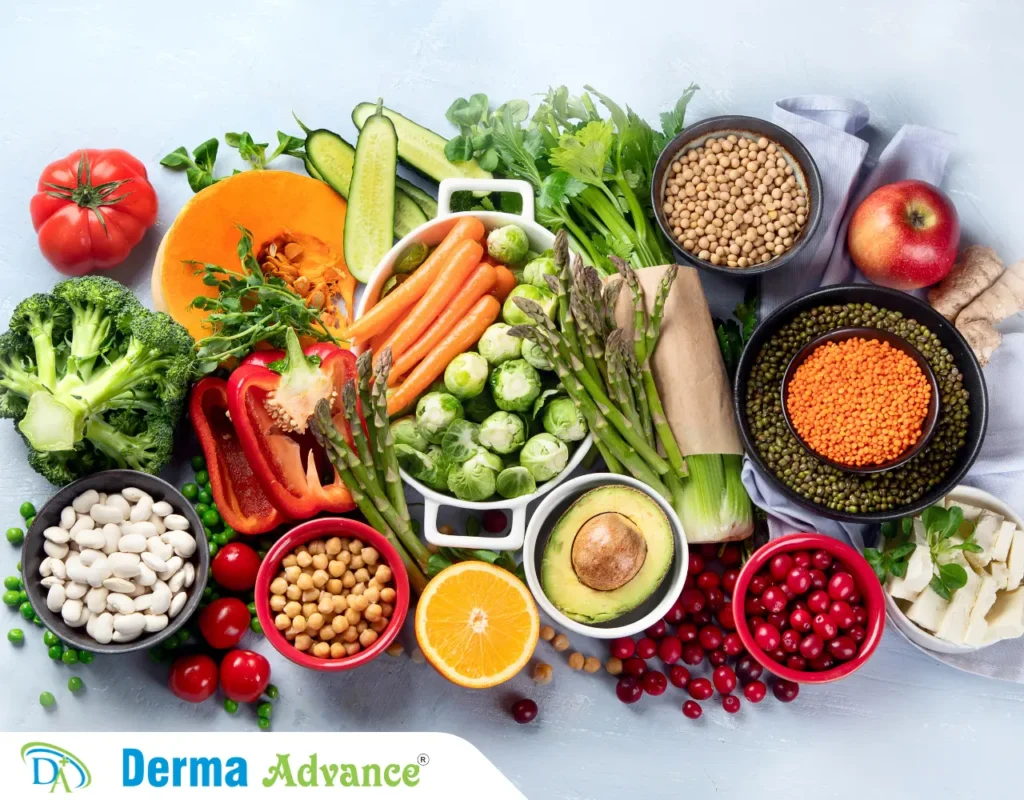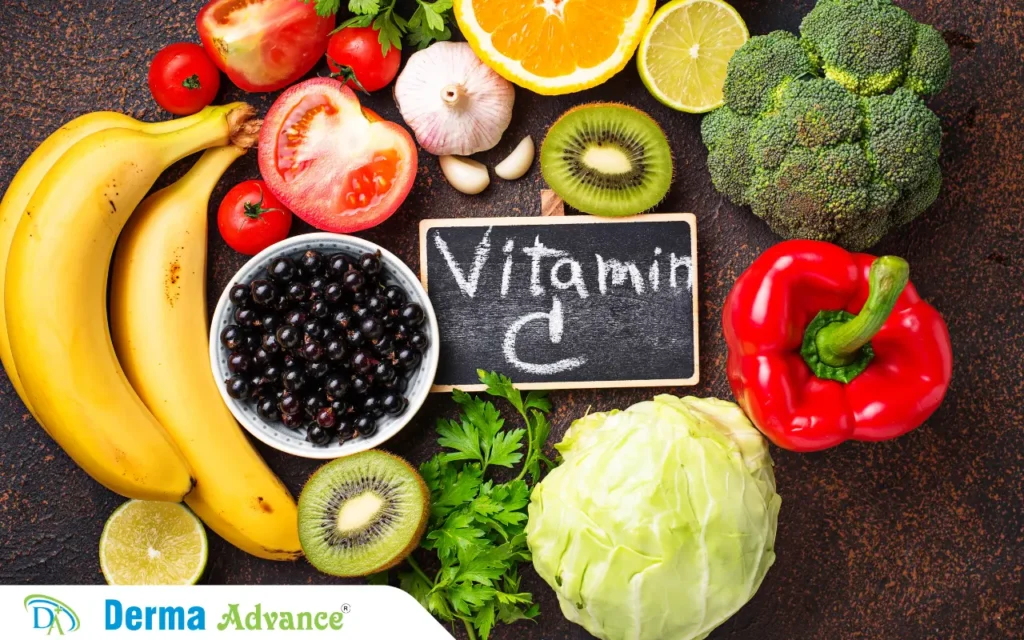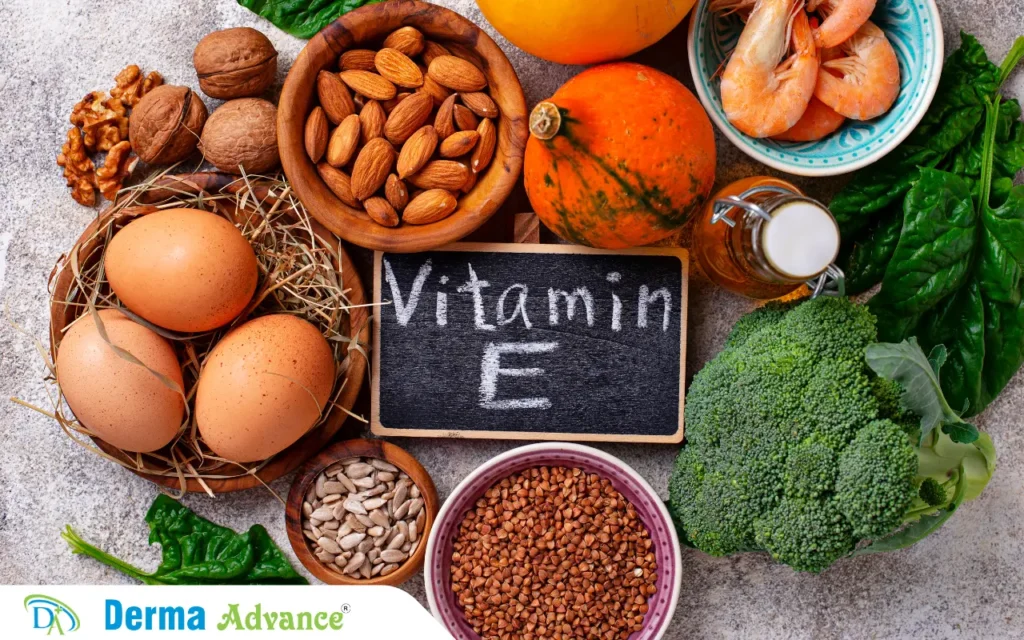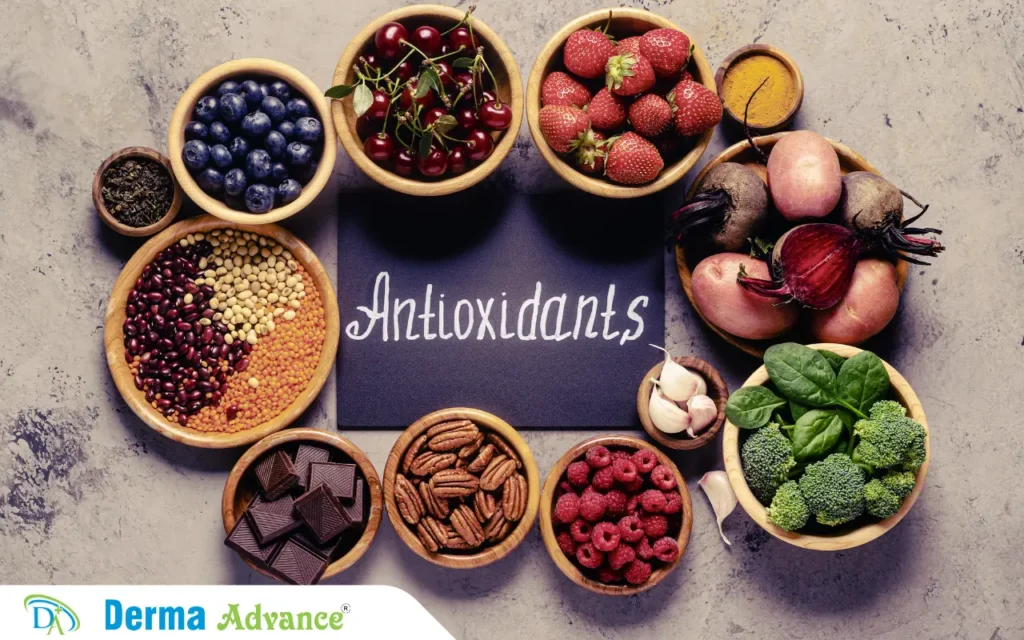Introduction to Diet for Pigmentation
When it comes to skin health, different types of spots on the skin, including hyperpigmentation and melasma, are common concerns for people across the globe. While various treatments exist, research suggests that what you eat plays a significant role in managing and reducing these types of spots on skin.
In this section, we will focus on how diet impacts pigmentation issues. Whether it’s the American diet, known for its rich variety of fruits and nuts, or the traditional remedies used in India and the Middle East, dietary habits can have a powerful effect on the types of spots on skin.
Table of Contents
What Causes Pigmentation?
Understanding the root causes of different types of spots on skin is essential before diving into dietary solutions. Pigmentation usually happens due to the overproduction of melanin, the pigment responsible for skin color. Factors like sun exposure, hormonal changes, and nutrient deficiencies often trigger an increase in melanin, leading to various types of spots on the skin.
The Role of Diet in Managing Pigmentation
While sunscreen and topical treatments are commonly used, diet is an often-overlooked factor that can either worsen or help reduce types of spots on skin. By incorporating foods rich in antioxidants, vitamins, and healthy fats, you can actively support your skin’s ability to heal and regenerate.
Types of Spots on Skin and the Impact of Nutrient Deficiency
Many types of spots on skin, such as dark spots, can be traced back to nutrient deficiencies. Lacking in vitamins like Vitamin C, Vitamin E, and Zinc may worsen pigmentation. For more insights on how to remove hyperpigmentation from your face, check out our dedicated guide on removing hyperpigmentation.
How Regional Diets Affect Skin Pigmentation
The types of spots on skin differ across regions due to varying dietary patterns. In India, traditional remedies like amla, neem, and turmeric are widely used to manage pigmentation. In contrast, the American diet often includes antioxidant-rich foods like berries and leafy greens, known for reducing types of spots on skin. For more information on this, explore our detailed section on melasma treatment.
Similarly, in the Middle East, antioxidant-packed foods like dates and olive oil are staples. These help in maintaining healthy skin and preventing the formation of different types of spots on skin, such as age spots and dark patches. Visit our page on types of dark spots for more information.
In conclusion, your diet plays a crucial role in the prevention and reduction of types of spots on skin. Whether you’re dealing with hyperpigmentation, melasma, or age spots, understanding the foods that benefit your skin is the first step to clearer, more even-toned skin. Want to dive deeper into this topic? Continue reading for an in-depth guide on the essential nutrients for pigmentation and how to create a skin-healthy diet.

What Causes Pigmentation?
Understanding what causes pigmentation is the first step in addressing the various types of spots on skin. Pigmentation often appears due to a combination of internal and external factors, with melanin production playing a central role in this process. Let’s explore the key causes behind these skin concerns.
The Role of Melanin in Pigmentation
Melanin is the pigment responsible for the color of our skin, hair, and eyes. Overproduction of melanin can lead to various types of spots on skin, including dark spots and patches. This excess production is often triggered by external factors like UV exposure and internal changes such as hormonal imbalances or nutrient deficiencies. To know more about how hyperpigmentation works, check our guide on hyperpigmentation on face.
Common Causes of Hyperpigmentation
There are several common triggers that lead to an overproduction of melanin, resulting in various types of spots on skin. Here are the main causes:
Sun Exposure
One of the most significant factors contributing to pigmentation is excessive sun exposure. UV rays from the sun increase melanin production, leading to dark spots and other pigmentation issues. This is particularly common in sunny regions like India and Dubai, where the sun’s rays are strong year-round. You can learn more about treatments for hyperpigmentation caused by sun damage in our section on hyperpigmentation treatments.

Hormonal Imbalances
Another major cause of pigmentation, particularly melasma, is hormonal imbalances. Conditions like pregnancy or menopause can trigger these imbalances, which are prevalent in regions like America and India. Melasma often manifests as dark patches on the skin and can be difficult to treat without proper guidance. For more information, visit our page on melasma treatment.
Nutrient Deficiency
A lack of essential vitamins and minerals such as Vitamin C, Vitamin E, and Zinc can lead to various types of spots on skin. Without the proper nutrients, your skin becomes more susceptible to pigmentation issues. Learn how to prevent this by reading our page on dark spot removal tips, which covers diet-related solutions.
The Importance of Diet in Treating Pigmentation
While topical treatments are common for pigmentation issues, diet plays a crucial role in skin health. The right foods can enhance your skin’s ability to regenerate and heal from damage, thereby reducing the appearance of various types of spots on skin.
How Diet Impacts Skin Health
The foods you eat directly influence your skin’s health and its ability to repair itself. A diet rich in antioxidants, vitamins, and healthy fats can significantly improve your skin’s appearance by addressing the root causes of pigmentation. You can explore more on how diet impacts skin health in our section on home remedies for pigmentation.

Dietary Deficiencies and Pigmentation
Deficiencies in essential nutrients like Vitamin C, Vitamin E, and Zinc are closely linked to pigmentation issues. A poor diet can not only slow down the healing process but also lead to an increase in dark spots and other types of spots on skin. This has been observed across various regions, including India and America, where nutrient deficiencies are common.
By focusing on a balanced diet and proper nutrition, you can effectively reduce pigmentation and maintain healthy, radiant skin. For more tips on diet and skin health, check our detailed guide on diet’s impact on acne.
Essential Nutrients for Reducing Pigmentation
Nutrition plays a key role in reducing pigmentation and maintaining healthy skin. By incorporating essential vitamins and minerals into your diet, you can prevent the overproduction of melanin and lighten dark spots naturally. Let’s dive into the most effective nutrients for managing pigmentation and their sources across different regions.
Vitamin C for Pigmentation
Vitamin C is one of the most powerful antioxidants for skin health. It helps to inhibit melanin production, reducing the appearance of pigmentation and dark spots. Including Vitamin C-rich foods in your diet is a natural way to promote brighter, even-toned skin.

Vitamin C-Rich Foods in America and India
Both America and India have diverse sources of Vitamin C that can be incorporated into daily meals. In America, common sources include oranges, lemons, and strawberries. These fruits are staples in smoothies, salads, and juices, making them an accessible part of an everyday diet.
In India, traditional remedies include amla (Indian gooseberry), which is known for its high Vitamin C content. To learn more about how Vitamin C can help with pigmentation, visit our detailed article on the role of Vitamin C in hyperpigmentation.
Middle Eastern Diet and Vitamin C
In the Middle East, vegetables like bell peppers, tomatoes, and citrus fruits are commonly consumed and are excellent sources of Vitamin C. These foods help neutralize free radicals and prevent further skin damage, thereby assisting in lightening pigmentation. To learn more you can visit National Institutes of Health [NIH].
Vitamin E
Vitamin E is another essential nutrient for skin health. Known for its moisturizing properties, it protects the skin from oxidative stress and helps repair damaged skin cells, reducing pigmentation over time.
Vitamin E Foods in the American Diet
In the United States, Vitamin E-rich foods such as almonds, sunflower seeds, and spinach are popular choices. Nuts and seeds, in particular, are often included in snack options or as toppings for salads and cereals. Learn more about natural pigmentation remedies in our article on home remedies for pigmentation.

Vitamin E in the Middle Eastern and Indian Diets
In Middle Eastern countries, sunflower oil is widely used in cooking and is a rich source of Vitamin E. In India, almonds are commonly featured in sweets and other traditional dishes. You can also find more about nutrient-rich diets and how they help with pigmentation in our section on treatments for hyperpigmentation.
Antioxidants
Antioxidants are vital for neutralizing free radicals that cause skin damage and pigmentation. They also help repair and rejuvenate the skin. Foods rich in antioxidants, such as berries, green tea, and leafy greens, are essential for maintaining clear and healthy skin. For more insights, check out our guide on removing hyperpigmentation from your face.

Omega-3 Fatty Acids
Omega-3 fatty acids help reduce inflammation that can worsen pigmentation. They also support healthy skin cell regeneration, making them a valuable nutrient for those looking to manage pigmentation issues.
Omega-3 Sources in India and America
In India, plant-based sources such as flaxseeds and chia seeds are commonly used to boost Omega-3 intake. These seeds are often added to smoothies or sprinkled over salads. In America, fatty fish like salmon and mackerel are popular Omega-3 sources, commonly included in balanced diets. To explore dietary approaches that can help with skin issues, visit our section on Melasma treatments.

Zinc
Zinc is a key mineral for skin repair and regeneration. It aids in wound healing and helps control melanin production, making it an essential nutrient for managing pigmentation.
Zinc-Rich Foods in India and America
Legumes, nuts, and seeds are excellent sources of zinc. In India, lentils, chickpeas, and pumpkin seeds are often included in everyday meals. Zinc-rich dals and curries are a common part of the Indian diet, helping to maintain healthy skin. In America, nuts, seeds, and beans are frequently consumed, offering various ways to ensure adequate zinc intake. For more on how to treat pigmentation effectively, visit our Melasma treatment page.

Region-Specific Diets for Pigmentation
Diet plays a significant role in skin health and pigmentation management. Different regions have unique dietary practices that can affect skin tone and pigmentation. Below, we explore how Indian, American, and Middle Eastern diets contribute to reducing pigmentation through various foods and traditional remedies.
Indian Diet for Pigmentation
In India, traditional dietary practices are deeply rooted in the use of natural ingredients and herbs, making them beneficial for skin health. The Indian diet emphasizes seasonal fruits, vegetables, and whole grains that are rich in antioxidants, vitamins, and minerals. To learn more you can read the article by Times of India.
Traditional Remedies in India
Home remedies have been a part of Indian culture for centuries. Here are some popular remedies and dietary practices that target pigmentation:
- Turmeric: Known for its anti-inflammatory and antioxidant properties, turmeric contains curcumin, which can help lighten pigmentation and brighten skin. Consuming turmeric in milk or using it in face masks is common in many households.
- Neem: Neem leaves are often used in traditional medicine for their antibacterial and antifungal properties. Consuming neem juice or incorporating neem powder into meals can help detoxify the body and improve skin health.
- Amla (Indian Gooseberry): Amla is exceptionally high in Vitamin C and antioxidants. It can be consumed fresh, in juices, or as a powdered supplement. Its regular consumption is believed to prevent pigmentation and promote overall skin health.
- Diet Rich in Fruits and Vegetables: An emphasis on a colorful plate filled with fruits like papaya, guava, and pomegranate, along with green leafy vegetables such as spinach and kale, provides essential nutrients for skin repair and rejuvenation.
- Lentils and Pulses: Rich in protein and zinc, lentils are a staple in Indian diets. They support skin repair and enhance collagen production, aiding in the reduction of pigmentation.
American Diet for Pigmentation
The American diet tends to focus on convenience and nutrition, with an increasing trend toward health-conscious choices. Many Americans are now incorporating more nutrient-dense foods into their diets, particularly those known for their skin benefits.
Popular Foods in America
Several foods and dietary trends are recognized for their positive effects on pigmentation:
- Berries: Blueberries, strawberries, and raspberries are rich in antioxidants, particularly Vitamin C and polyphenols, which help combat free radicals and reduce pigmentation.
- Leafy Greens: Vegetables like kale, spinach, and Swiss chard are packed with vitamins A, C, and K, all of which play a role in maintaining skin health and preventing pigmentation.
- Nuts and Seeds: Almonds, walnuts, and sunflower seeds are not only good sources of Vitamin E but also contain essential fatty acids that help maintain skin elasticity and hydration.
- Fatty Fish: Salmon and mackerel are high in Omega-3 fatty acids, which help reduce inflammation and support skin barrier function. These fish are often included in weekly meal plans for their health benefits.
- Supplements: Many Americans also turn to supplements, particularly Vitamin C and Omega-3, to ensure adequate nutrient intake for skin health. These supplements are commonly found in health food stores and pharmacies.
Middle Eastern Diet for Pigmentation
The Middle Eastern diet is characterized by an abundance of fresh produce, grains, and healthy fats. This region’s culinary traditions include a variety of foods known for their health benefits, particularly for the skin.
Foods Commonly Used in Dubai
In Dubai and other Middle Eastern countries, several foods are staples for maintaining healthy skin and managing pigmentation:
- Pomegranates: Rich in antioxidants and vitamins, pomegranates are believed to improve skin texture and reduce pigmentation. They can be consumed fresh, in juice form, or as a component in various dishes.
- Dates: These sweet fruits are not only a traditional snack but are also packed with vitamins and minerals that promote skin health. Their high antioxidant content helps combat oxidative stress.
- Olive Oil: A primary fat source in the Mediterranean diet, olive oil is rich in healthy monounsaturated fats and antioxidants. It is used in cooking and as a dressing, contributing to overall skin health and hydration.
- Legumes: Foods like chickpeas and lentils are commonly consumed and are excellent sources of protein and essential nutrients that support skin repair and pigmentation management.
- Herbs and Spices: Ingredients like saffron and za’atar are often used in cooking and are known for their health benefits, including anti-inflammatory properties that can help with pigmentation.
Diet-Based Treatments for Pigmentation
Diet plays a crucial role in managing skin health and pigmentation. Certain dietary choices can help detoxify the skin, promote hydration, and provide essential nutrients that combat pigmentation. Below are key diet-based treatments recognized for their effectiveness.
Detoxifying with a Plant-Based Diet
A plant-based diet, abundant in fruits and vegetables, is one of the most effective ways to detoxify the body and improve skin health. This type of diet not only supports overall wellness but also provides the necessary antioxidants and vitamins that play a significant role in reducing pigmentation.
Here are some key components of a plant-based diet that aid in detoxification:
- Fruits: Fruits like berries, oranges, and papayas are high in vitamins and antioxidants that help neutralize free radicals, reducing oxidative stress and preventing pigmentation.
- Vegetables: Leafy greens such as spinach and kale, along with cruciferous vegetables like broccoli, are packed with nutrients that support liver function and enhance detoxification processes.
- Whole Grains: Foods like brown rice, quinoa, and whole wheat provide fiber that aids digestion and helps eliminate toxins from the body, promoting clearer skin.
- Legumes: Beans and lentils are rich in protein and fiber, helping to stabilize blood sugar levels and reduce skin inflammation.
- Nuts and Seeds: Incorporating a variety of nuts and seeds provides healthy fats, which are essential for maintaining skin moisture and elasticity.
By focusing on a diet rich in these plant-based foods, individuals can enhance their skin’s detoxification process, leading to improved clarity and a reduction in pigmentation issues.
Hydration for Healthy Skin
Hydration is vital for maintaining healthy skin, as it helps flush out toxins and supports the skin’s natural barrier function. Drinking adequate water can greatly impact skin appearance and reduce pigmentation.
Water Intake in the Middle East
In hot climates like Dubai, staying hydrated is particularly essential due to high temperatures and increased perspiration. Here are some tips for maintaining hydration:
- Daily Water Goals: Aim to drink at least 2-3 liters of water daily, depending on activity levels and environmental conditions. This helps keep the skin hydrated and flushes out toxins.
- Infused Water: Adding slices of fruits like lemon, cucumber, or mint to water not only enhances flavor but also provides additional nutrients that promote skin health.
- Avoiding Dehydrating Beverages: Limit consumption of caffeinated and alcoholic drinks, as these can lead to dehydration. Instead, opt for herbal teas or coconut water, which offer hydration along with nutrients.
- Hydrating Foods: Incorporate foods with high water content into your diet, such as cucumbers, watermelon, and oranges, to further support hydration.
Maintaining proper hydration levels is a simple yet effective strategy to improve skin health and prevent pigmentation.
Supplements to Include in Your Diet for Pigmentation
In addition to dietary changes, certain supplements can play a crucial role in managing pigmentation and promoting skin health. Here are key supplements that are beneficial:
Vitamin C Supplements
Vitamin C is a powerful antioxidant that helps protect the skin from damage caused by UV rays and pollution. It also aids in collagen synthesis, essential for maintaining skin elasticity and reducing pigmentation.
Usage in India and America
In both India and America, Vitamin C supplements are widely recognized for their skin health benefits:
- Oral Supplements: Many individuals take Vitamin C capsules or tablets to ensure adequate intake. This is particularly beneficial for those who may not consume enough Vitamin C-rich foods in their diet.
- Topical Applications: Alongside oral supplements, Vitamin C serums are popular in both regions. These serums can be applied directly to the skin to enhance brightness and reduce pigmentation.
- Recommended Dosage: A typical dosage of Vitamin C supplements ranges from 500 mg to 2000 mg per day, but it’s essential to consult a healthcare professional for personalized recommendations.
Regular intake of Vitamin C, whether through diet or supplements, can significantly improve skin tone and reduce pigmentation.
Fish Oil and Omega-3 Supplements
Fish oil supplements are rich in Omega-3 fatty acids, known for their anti-inflammatory properties. They can help reduce skin inflammation and improve overall skin health.
These supplements are particularly beneficial for individuals who do not consume fish regularly:
- Benefits: Omega-3 fatty acids help to maintain the skin’s lipid barrier, keeping it hydrated and reducing the risk of pigmentation.
- Usage in America and Dubai: Fish oil capsules are commonly found in health stores and pharmacies, and many people include them in their daily supplement routines to promote skin health.
- Vegetarian Alternatives: For those who prefer plant-based options, algae oil supplements are available, providing a similar source of Omega-3s without the need for fish.
Incorporating fish oil or Omega-3 supplements can support skin health and help manage pigmentation effectively.
Conclusion
A well-rounded diet tailored for pigmentation can significantly enhance your skin’s appearance by reducing dark spots and preventing new ones from forming. Across different regions—from India to Dubai and America—dietary habits and local foods profoundly influence skin health. By focusing on incorporating foods rich in antioxidants, vitamins, and healthy fats, you can effectively manage pigmentation. It’s equally important to limit excessive sugar and dairy, as these can contribute to skin issues.
At Derma Advance, we understand the intricate relationship between diet and skin health. Our team of experienced dermatologists is dedicated to providing personalized skincare solutions that address pigmentation concerns while promoting overall skin wellness. Whether you’re seeking dietary advice, advanced treatments, or expert consultations, we are here to support you on your journey to radiant, healthy skin. Visit us today to learn more about how we can help you achieve your skincare goals!
Frequently Asked Questions (FAQs)
What is pigmentation, and what causes it?
Pigmentation refers to the coloration of the skin caused by the production of melanin. Factors such as sun exposure, hormonal imbalances, and nutrient deficiencies can trigger excessive melanin production, leading to dark spots and uneven skin tone.
How can diet impact pigmentation?
A well-balanced diet rich in antioxidants, vitamins, and healthy fats can improve skin health and reduce pigmentation. Foods that contain Vitamin C, E, and Omega-3 fatty acids help combat oxidative stress and inflammation, which are key contributors to pigmentation issues.
What are some effective foods for reducing pigmentation?
Foods high in Vitamin C (like oranges and amla), Vitamin E (such as nuts and seeds), and antioxidants (like berries and leafy greens) are particularly beneficial for reducing pigmentation. Staying hydrated is also crucial for maintaining healthy skin.
Are there specific dietary recommendations for different regions?
Yes, dietary habits vary by region. For example, traditional Indian remedies often include turmeric and neem, while American diets may focus on berries and leafy greens. Middle Eastern diets commonly feature pomegranates and olive oil, all of which can help manage pigmentation.
What role do supplements play in treating pigmentation?
Supplements like Vitamin C and Omega-3 fatty acids can support skin health and reduce pigmentation, especially for individuals who may not obtain sufficient nutrients through their diet. Consult a healthcare professional before starting any new supplement regimen.
Can I treat pigmentation solely through diet?
While a healthy diet is essential for managing pigmentation, it is often most effective when combined with other treatments, such as topical therapies or professional dermatological services. Consult with a dermatologist for a comprehensive treatment plan.
How much water should I drink for optimal skin health?
Staying hydrated is vital for skin health, particularly in hot climates. Aim for at least 8 glasses (about 2 liters) of water a day, but individual needs may vary based on factors like activity level and climate.
Where can I find professional help for pigmentation concerns?
For personalized skincare solutions, including dietary advice and advanced treatments for pigmentation, consider visiting a specialized dermatology clinic like <strong>Derma Advance</strong>. Our team of experts is dedicated to helping you achieve healthy, radiant skin.

